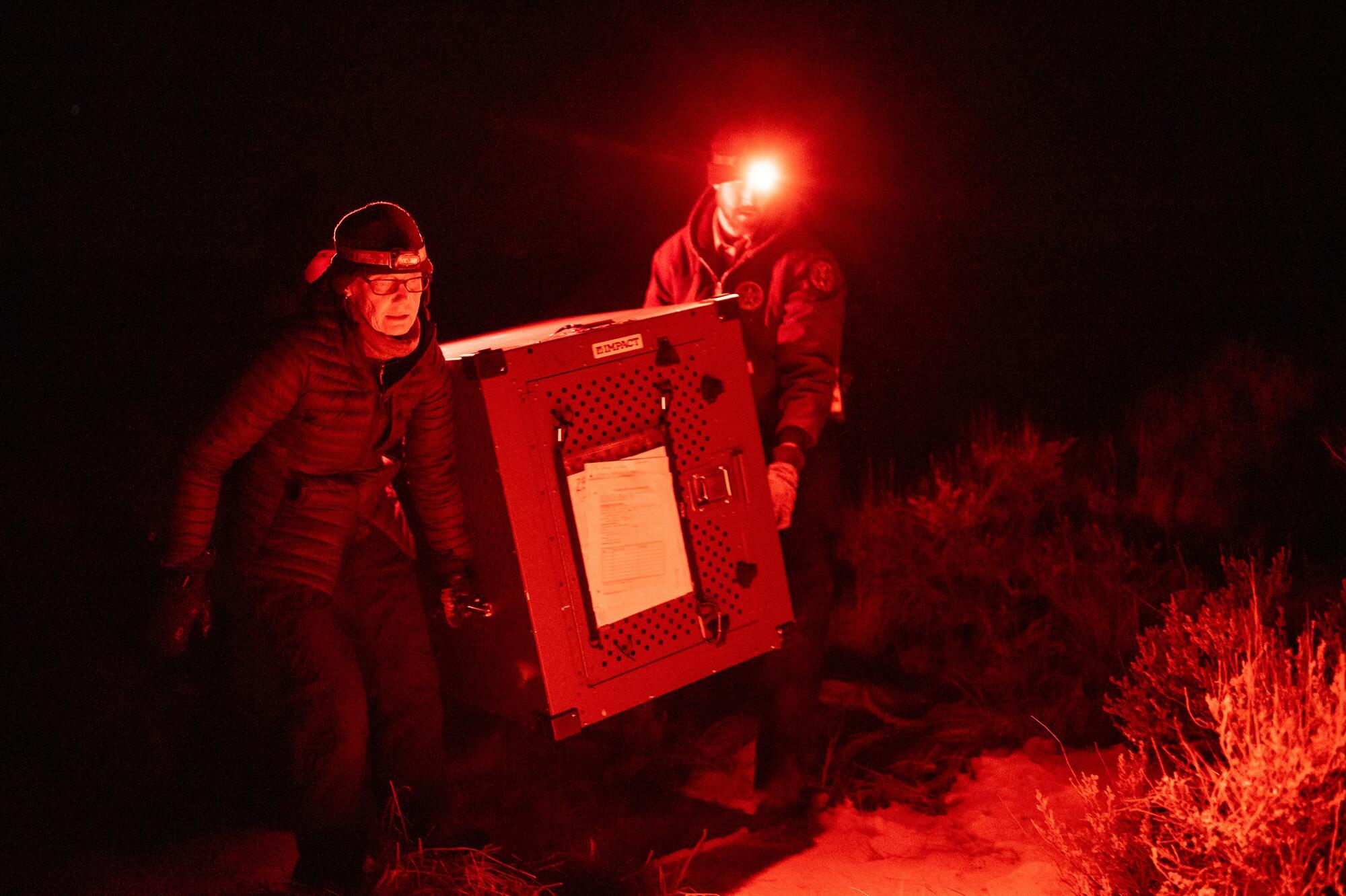
Colorado Sens. Michael Bennet and Cory Gardner both voted Thursday for a compromise to stave off another partial government shutdown — and said they didn’t want President Donald Trump to declare a national emergency to build a wall at the border.
Gardner, a Republican, and Bennet, a Democrat, spoke to Colorado Matters Thursday morning before word emerged that Trump planned to issue the order.
When asked whether Trump should declare an emergency or use other federal funds to pay for the wall, Gardner said he had personally told Trump he opposed both steps.
“I think Congress needs to do its job," Gardner said.
The senators also discussed their political futures. As 2020 nears, both are facing big decisions.
Gardner is up for reelection, and a score of Democratic challengers have already staked their claims to his senate seat. He recently endorsed the president after initially seeking distance from him.
Meanwhile, Bennet's name is on the list of possible Democratic presidential candidates. The Democratic senator teased his candidacy on Meet The Press last week.
Full Transcript
Ryan Warner: This is Colorado Matters from CPR News. I'm Ryan Warner. And ooh, it is a big news day. In Denver, of course, an apparent end to the teacher's strike. But we're going to start in Washington, where it's also shaping up to be a huge day. Congress is expected to vote on a border security compromise. If the president signs the spending bill, it would prevent another partial government shutdown. From D.C., we're joined by Colorado's two U.S. senators, Democrat Michael Bennet and Republican Cory Gardner. We're going to talk about the shutdown vote, also their own political futures and a recent public lands bill they both worked on, and gentlemen welcome to the program. Sen. Michael Bennet: Thanks for having us. Sen. Cory Gardner: Thanks for having us. RW: Most people expect this package will pass Congress, but there's still some doubt whether the president will sign it, and he's made it clear several times this week that he plans to build a wall, which he's of course promised for years. Yesterday, he said the wall is very, very on its way. Sen. Gardner, let's do a reality check here. Congress controls the purse strings for the most part, is it realistic for the president to get the wall built without Congress? CG: Well again, you'd have to check the legal authorities that may be there, but I don't think he should do anything without Congress' approval. I think it's important for Congress to have the appropriate oversight. That's why this deal, I think, is a compromise that he will sign. I believe he will. Nancy Pelosi said she would not allow one dollar to go toward the barriers on the border. President Trump said he wanted $5.7 billion, and this finds a reasonable path forward allowing the government to maintain itself in operation, while also providing funding for border security. RW: How do you get the message to him that you don't want him to perhaps declare a national emergency, as has been hinted? Or, raid other funds for this. How does — CG: Well, it's pretty simple. I'd tell him that in person, that I think Congress needs to do its job. RW: Have you done, that? And do you — CG: I have. RW: You have? All right. Sen. Bennet, what do you make, let me ask this Sen. Gardner, you plan to vote I imagine for this compromise? CG: At this point yes, we're still going through the legislation, but I think it's important that we keep the government open. We can fund border security and keep the government open, but I don't think a government shutdown is the right decision to make. RW: Okay, Sen. Bennet will you vote for the compromise? And then I'd love your thoughts on what we're hearing from the president about moving ahead to find other monies. MB: I think I will support the compromise. It is essential that we don't close this government down. If you look at the terms of this compromise, it is impossible to justify the 35 day government shutdown we had. It was ridiculous. It was harmful to our country, it hurt our economy, and we have been distracted by this nonsense of the president's failed promise to have the Mexicans pay for his wall since he's been president of the United States, and we need to move on. There are a lot of other things that the American people are concerned about. RW: What do you make of the president saying that the wall is "very, very on its way"? MB: I think if you look at the graphic on the front page of the New York times, you will see how much of the wall he has built. Zero miles. He's built nothing. He wants the issue of the wall. He doesn't want the wall. He doesn't want the accountability of building the wall. RW: What would you — MB: And the rest of us need to not be sucked into this vortex of distraction and discombobulation. We've got an economy that while it's growing is, the bottom 90 percent of Americans still haven't seen a raise in 50 years. They can't afford housing, healthcare, higher education and early childhood education. These are the things we need to be focused on. Unfortunately, the president now, and you're right. He's saying, "Well, I'm going to build it with emergency money." I mean, that's not the way the Constitution is writ10. He says he's going to seize the land through eminent domain from farmers and ranchers in Texas. That's not a principle that most of us subscribe to. RW: Sen. Gardner, is the wall a distraction? CG: I don't think Border Security is a distraction. I think we need to have the conversation in this country. RW: Is the wall, though? CG: I think we're talking about border security here. If you're talking about border security, then it's not a distraction. I don't think we should frame this in distracting terms, and if people are trying to use it as a distracting term, then it's going to be used as a distracting term. But what I've talked about, and I think what Coloradans want, what Sen. Bennet and I have worked on together in bipartisan fashion over the past several years is appropriate levels and solutions for border security. Finding a solution to our DREAMers in Colorado and this country, fixing a broken immigration system. That's what we need to continue to focus on. RW: Though what we know about a lot of folks who are in the country illegally is that they of10 have gone through legal ports of entry, and overstay visas, and that those legal ports of entry are also where a lot of drugs come through. I'd like to move on, because you both have big political hopes for 2020 — MB: Could I just, Ryan, comment on that point, though? RW: Yeah, go ahead, Sen. Bennet. MB: 40 percent of the people here that are undocumented are people that came in here lawfully and overstayed their visa. The bill in 2013 that I helped write as part of the Gang of Eight, which had $46 billion in border security in it, so this is not an aversion to border security you're hearing from me. We need to have border security. We need to have internal security in this country. We need to know who's overstayed their visa, and who should stay, and who should leave. All of which was dealt with in that 2013 piece of legislation. So it's not as if we don't have a solution. It's just that I don't think the president is aware of the bipartisan work that's been done in the Senate. CG: I would just point out too that I think the bill that we introduced last spring had around $25 billion in border security. The bipartisan bill authorized — MB: It authorized it. CG: So it authorized for it, yeah. So, that's something I think important to highlight, the bipartisan work that's taken place in Colorado. RW: In a few minutes, I may ask more about the bills you've worked on together, but to your individual political futures first. Sen. Gardner, you're up for reelection next year. In Colorado of course, Democrats swept races up and down the ballot just last fall. That was widely seen as a repudiation of President Trump, whom you recently endorsed. Why did you decide to endorse him now? CG: Well if you look at the people that he'll be running against who will receive the Democratic nomination, these are people who have embraced higher taxes, more regulations. They want to undo a lot of the progress that's been made in the economy for people across our country who were able to take more of their own pay home. We've heard socialized medicine efforts, people that want to take away 150, 160 million people's insurance. I don't support that. We've heard talks of a lot of things that they want to do, and this creep, ever creep towards socialism, I think is the wrong direction for our country. RW: I think those folks who want to take people's insurance away, as you put it, might put it differently, and say they want to make sure that there's — CG: Well, they did not. I mean, lis10 to what Kamala Harris said. She said, "Let's just do away with that." That's not my words. That's what she said. When it comes to somebody's insurance in this country, she said, "Let's just do away with that." That's not making it up. Those are her words on national television. RW: I would think the idea though is to make sure that people are covered in terms of healthcare. Do you have any misgivings? CG: She would take their insurance away. Now, you can't put words in her mouth. What she said is, "We will take their insurance away." That's what she said. RW: Do you have any misgivings about endorsing the president before the results of the Mueller investigation? CG: I think the Mueller investigation should continue. I think it should be made public, but again, I'm not going to be supporting a presidential candidate who supports socialism. RW: Sen. Bennet, on Meet the Press last weekend, you hinted strongly that you may run for president. You said, "I've got a different set of experiences than the other folks in the race." Do you want to announce your candidacy here? MB: Well, it would give Sen. Gardner somebody to vote for who's not for socialism. RW: That's right. I agree with that. I agree. MB: I do not want to announce it here, but thank you for the invitation. RW: You're very kind. You said that a couple of things set you apart from other Democrats in this race, that you have business experience, and before you were a senator you ran Denver Public Schools, also in the news today. You know, those credentials sound similar to another Colorado Democrat who's expected to announce for President soon, former Gov. John Hickenlooper. He ran a business, then he was Denver's mayor. How would you set yourself apart from him, hypothetically, if you ran? MB: Well, I think the road is long Ryan, before I'd have to set myself apart from John, or John me. He did a great job as governor, he did a great job as mayor. I'm glad he's running for President. I think his perspective will be useful. Obviously we've had different experiences in the last 10 years. He's been in Colorado, and I think he would argue that that's an asset for the presidential race, because he's not been in the swamp of Washington, D.C. I've got to spend the last 10 years here, learning how this place doesn't work. Understanding the corruption of Washington, understanding what we have to do to change it, in order to begin to move the country forward, again, which we need to do. Our politics are broken. We can't spend another 10 years like we've spent the last 10 years, particularly when we see China ascending, not only domestically but across the globe, while we're distracted by things like whether we're going to spend $5.7 billion or $1.7 billion on border security. There's a better use of our time. I think the American people need to have candidates that run for president who tell the truth, about where we are and where we need to head. RW: Sen. Gardner, I'd love to follow up on something you told us earlier, which is that you've spoken with President Trump about your concerns about something like an emergency order to go ahead with the wall. I didn't really ask you what his response was when you talked to him. CG: You know, the response was, "Hey, well let's see what the Congress comes up with." So I think what we've got to do in Congress is to do our job. Now I think border security is an important part of that. I don't think anybody disagrees with that. I think, just last year around this time, we had over 50 votes. We had 54 votes, I believe it was, for a bill that had a package of immigration reforms in it. It had $25 billion in it for border security, it had a fix to DACA, it had some other adjustments in immigration, and it had 54 senators, Republicans and Democrats, supporting it. I think it's important that we continue to lead, we continue to do that work. And I'm committed to working with Sen. Bennet, and colleagues across the aisle, Sen. Durbin, Sen. Graham, to find a solution that's right for Colorado and this country. MB: I think the President is searching for a problem where there is none. Border security is very important. We have to have a secure border. Almost everybody I know here agrees with that. The problem that he has is that he made a promise over, and over, and over again to the American people, that he was going to build a wall end to end, and that Mexico was going to pay for the wall. And that was false, and it is false today. So now he's asking the taxpayer to pay for the wall. The bill we had in 2013, with all that border security, which was far greater in dollar amount than what the President is proposing, all of that was paid for by immigration fees. None of it was paid for by the taxpayer. RW: Senators, you two have worked together on a number of issues. So last year around this time, as you've been referencing immigration was a big issue, and you introduced a bill that would have settled the debate over border security and the future of DREAMers. You've collaborated on marijuana bills, funding to fight wild fires, just to name a few. Most recently, Congress approved a package of bills dealing with public lands. That's an issue of high interest in Colorado. You both worked on that. Would you each give me a way Colorado benefits or maybe could have benefited more? Sen. Gardner? CG: Yeah, look, I think this legislation is very important for the people of Colorado and this country. Our outdoor economy in Colorado is over a $20 billion. We have over 100,000 people employed in the outdoor economy. We have the outdoor industry show that just finished up in Denver. We'll have another one coming up again this year. So it really is a huge, huge economic driver. Legislation I carried would require the Commerce Department to break out the outdoor economy as part of our national economic reports. This public lands bill fits right in with that effort. If you look at the legislation in it, there are probably 120 different bills compiled within this bill, I think almost 10 percent or more of the bill dealt directly with Colorado. We added land to the Florissant National Monument down at Florissant, Colorado. We added land to Rocky Mountain National Park. We fixed the water system or allowed for the water system in Minturn, Colorado to be fixed. We authorized a study to determine whether or not Amache, home to a Japanese American internment camp, a dark period of American history should be added to the National Park System so that we can look at that as something that we would never repeat again. We passed legislation that would give firefighters GPS to help prevent injury from occurring, men and women in firefighting to allow them to do a better job of managing the fires and the direction of the fires through UAVs. So it's a really big bill for Colorado. RW: A big bill. And do you reflect that as well, Sen. Bennett? Is there more you'd like to have seen in this public lands package? MB: Well, I'd add that there are a couple of more things in the bill that, that are really good. That Minturn bill by the way, is something we've been working on for a long time — CG: Years. MB: And it's really, really important to the community there. This bill also permanently reauthorized Land and Water Conservation Fund, which is critically important to Colorado and all 50 states. Of particular interest to me is that it included the 21st Century Conservation Service Corps Act, which is a bill that I worked on with the late Sen. John McCain. I'm just so grateful that, that bill was included as part of this. It will make it easier for veterans and for young people to work in our forest and on our public lands. I obviously, there's other stuff that I would have liked us to pass the CORE Act, which I introduced last year. That's a combination of my San Juan's bill and continental divide bill that would protect 400,000 acres in Colorado, including 73,000 acres and wilderness. That's something we have not done. It's not been included in this bill and it's, the CORE stands for Colorado Outdoor Recreation and Economy Act, a reflection of what Sen. Gardner was just talking about in terms of the importance to our economy. So I'm hopeful that in the coming year we're going to be able to move that forward. CG: And Ryan I think just on the Land and Water Conservation Fund alone, Colorado has benefited, I think to the tune of $258 million worth of LWCF funds that have come back to the state through that program. It's at no cost to the taxpayer. There's a local portion where you can use local parks for it. Obviously, one of the best examples is the purchase of land on the Rim of the Black Canyon of the Gunnison National Park, that would prevent it from being developed but being added to the park. So it really is a remarkable program, crown jewel of our conservation programs. MB: And that's another unfinished piece of business, Ryan, is fully funding the Land and Water Conservation Fund because we're funding it today at about half of what the authorization says it should be. That's a bill that I've been working on with Richard Burr, a Republican from North Carolina and Maria Cantwell from Washington. And I know Cory supported that as well. CG: I'm co-sponsor of the bill as well. RW: But I know that Sen. Bennet, you would have liked to have seen more new land set aside for wilderness protection. We have about three minutes left, and I know that you collaborate on any number of issues, but I have to think that you're only friends to a point. What is the issue right now that you most disagree on? Sen. Gardner? CG: Look, I don't even know if I could say that we, we don't have those conversations, Sen. Bennet and I don't, and I don't think we should say what do we most disagree on. RW: Well what conversations do you have about what issues where you go, "Gosh, we don't see eye to eye" CG: Well, we talk about opportunities to work together. The problem with Washington, if you get stuck in what you don't agree on, you're never going to get anything done. So the conversation ought to be, "Hey, we may have a different approach to health care. We may have a different approach to immigration, but how can we find a way to find a solution that's the right thing?" Sen. Bennett and I don't spend time trying to figure out why or where we disagree. RW: I understand that that's not the end. I'm just asking about the process in which you have not seen eye to eye. Sen. Bennett, how would you answer it? MB: I would say that we don't, he's right. We really don't engage in that kind of process. There obviously have been disagreements. I'll frame my disagreement is one with the President of the United States rather than my colleague with whom I agree on many things. I think the president's tax bill has been, that's something that I think should be reversed. I think that it increases the income inequality that we have in this country at a time when income inequality is greater than it has been in a century, and it has produced the first massive deficit at a period of economic growth since Vietnam. That was the last time we saw unemployment falling and the deficit shooting through the roof. And he claimed over and over and over again, just as George Bush did when he cut taxes in 2001, 2003, after we had already invaded Iraq, that they would pay for themselves. And once again, it's not paying for itself. RW: Sen. Gardner, I'll give you the last word. Would you respond to Sen. Bennet's framing of the tax overhaul? CG: Well, obviously I think it's important to cut taxes on the American people. I supported the tax cuts because I believe allowing businesses and people to keep more of their own money in their own pockets is important. I don't disagree that we ought to look at ways to cut wasteful spending as well. That's important to control our deficit and I support a constitutional balanced budget amendment that could address a lot of these questions when it comes to debt and spending issues. But yesterday, we saw a number from Gallup that showed American people actually have greater confidence in their financial well-being than they've had in over a decade. We've seen wage growth. We've actually seen people come in off of the sidelines from the economy, people who didn't have a job, who are getting a job because more jobs are opening up and available. There's actually a little bit more transiency within the job sector right now as people are now willing to leave the job that they're in to seek another job because it has better benefits. So we're actually seeing some things that we haven't seen in a very long time. MB: I think the American people need to know Ryan, that since 2001 we've cut taxes $5 trillion and almost all the benefit of that has gone to the wealthiest people in America. And we've spent more than $5.6 trillion in the Middle East. That's $11 or $12 trillion, the president said the other day it was $7 trillion in the Middle East. $12 trillion we have not invested in the American people. RW: Colorado's U.S. senators there, Democrat Michael Bennet of Denver and Republican Cory Gardner of Yuma. Thanks for getting so much in in these few minutes gentlemen. MB: Appreciate it. RW: Joining us live from Washington. This is Colorado Matters from CPR News. |








